New meaning for 'heavy lift'

In tandem, 300- and 500-ton cranes slowly lifted the 92-ton truss into place at the Sports Performance Center. Photos by Christopher Gannon.
How long does it take to hoist a 92-ton steel truss 40 feet? As several dozen spectators observed Friday morning at the athletics department's Sports Performance Center construction site, less than three minutes -- with a 300-ton crane, 500-ton crane and two-man teams in three lifts providing a steadying hand as needed.
The truss, measuring nearly 221 feet long and 38 feet tall, provides the structure for the center's east glass exterior on the third and fourth levels (see sketch below). It was manufactured in pieces at Johnson Machine Works, Chariton. A team from Northwest Steel Erection, Grimes, then spent 2.5 weeks assembling it on site before lifting and welding the truss into position Friday.
The Sports Performance Center is scheduled for completion next April. The larger project for the department includes demolition of the Olsen building for a north plaza, some remodel in the Jacobson Building and a north concourse and accompanying hillside improvements for the football stadium. Work has begun on these pieces and should wrap up by August 2021.
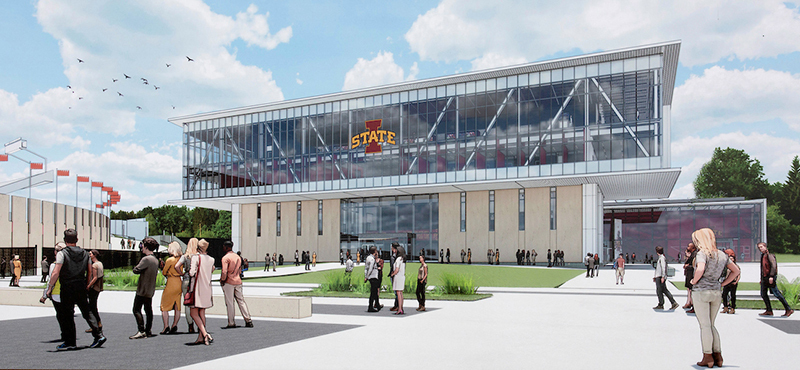
Architect drawing of the Sports Performance Center depicts the structural function of the truss for the third and fourth levels.

Crew members in a boom lift guide the truss as it's lifted 40 feet off the ground.

Once the truss was in place, welders completed the first contacts between truss and extension beams on the Sports Performance Center.
Wintersteen, senior leaders address questions on next steps
President Wendy Wintersteen and several senior ISU leaders held a virtual town hall for faculty and staff May 4, answering live questions from employees for about 40 minutes.
In opening remarks, Wintersteen gave a status report on Iowa State's response to COVID-19 and thanked faculty and staff for their commitment in the face of historic challenges.
"The stories that we hear every day about how you have responded to keep us moving forward, these are stories that we will remember forever," she said.
Summer planning
A group from Iowa State's COVID-19 incident command leadership is developing recommendations to safely gear back up daily operations on campus this summer, including strategies for social distancing, personal health monitoring, and other infection control and risk mitigation efforts in accordance with Centers for Disease Control and Prevention, the Iowa Department of Public Health and guidance from Gov. Kim Reynolds. Additional information will be released within days. The summer planning group includes:
- Erin Baldwin, assistant vice president for student health and wellness and director of the Thielen Student Health Center
- Michael Newton, associate vice president for public safety and ISU police chief
- Clayton Oliver, emergency manager, environmental health and safety (EHS)
- Stephen Simpson, EHS director of emergency management and outreach
- Kristi Darr, interim vice president of university human resources
In the Q&A portion of the forum -- the second virtual town hall for employees since the beginning of the coronavirus crisis, though there weren't any questions during the first session due to technical difficulties -- senior leaders shared information about what's next for Iowa State, though much is still up in the air. Below are some highlights from their answers. A video recording of the session is available.
State funding is key
Wintersteen said Iowa State projects about $88 million in lost revenue and $1 million in new expenses through the end of August -- figures that don't include the impact on research. The state Board of Regents has proposed freezing tuition rates, and even before the coronavirus, plans for the fiscal year 2021 budget beginning July 1 included a 5% reduction due to an expected drop in enrollment. Another 5% budget cut now is planned for fiscal year 2022.
Asked about the possibility of trimming personnel costs with furloughs or an early retirement program, both used to help balance a budget reduction during the 2009 recession, Wintersteen said it's too soon to know if those options will be needed. State funding will be a key determining factor. Budget planners have been expecting flat state appropriations, but Iowa's tax revenue will fall sharply because of the pandemic. If state lawmakers set the fiscal year 2021 budget in June as Wintersteen expects, decisions about cost-saving measures could come in July, she said.
Money saved by the reduced utility costs of limiting work on campus to essential duties is being tracked, interim senior vice president for operations and finance Pam Cain said.
Summer plans soon
Several employees asked about the timeline for faculty and staff returning to campus. Wintersteen said a committee is making recommendations for summer plans and some details will be released soon. For now, all in-person events scheduled on campus have been canceled or postponed through May 31. All summer classes are being taught online.
"In the next week or so, we're going to have some information on how we're going to gear campus back up," she said.
ISU police chief and associate vice president for public safety Michael Newton said campus officials have been coordinating with city and county leaders as they consider ways to restart.
"The things we do here at Iowa State have great impact on them," he said.
Forward into fall
The committee preparing for the return to normal-as-can-be operations in the fall began meeting this week. Much could change in the next three months, so most fall-related questions employees posed don't have certain answers -- such as when the Student Innovation Center will open or how social distancing will be maintained in residence and dining hall settings.
Committee chair John Lawrence, vice president for extension and outreach, said classroom density is one area being studied. It's possible that available public spaces in facilities such as the Scheman Building and Hilton Coliseum could be used for classes to allow for appropriate distancing, he said.
While online courses will be more prevalent than before, senior vice president and provost Jonathan Wickert said practical hands-on learning will remain the hallmark of the Iowa State experience.
"We are a residential campus. We know all the fantastic learning that takes place in the context of a residential campus -- in the classroom and outside the classroom," he said.
Masks and tests
Recommendations from the committees on summer and fall reopening plans will explore the extent to which mitigation such as face masks and regular coronavirus testing will be needed on campus, Wintersteen said.
Environmental health and safety released a video with instruction on how to safely wear and remove a cloth face mask, said Erin Baldwin, assistant vice president for student health and wellness and director of the Thielen Student Health Center.
Working from home
Before the COVID-19 crisis, a university human resources (UHR) project team was studying how to broaden the use of flexible hours and work-from-home arrangements. The project team is adjusting its plan to incorporate lessons learned since mid-March and hopes to introduce some guidance to help those options become a more regular part of ISU culture, interim vice president of UHR Kristi Darr said.
University gears up for a virtual graduation weekend
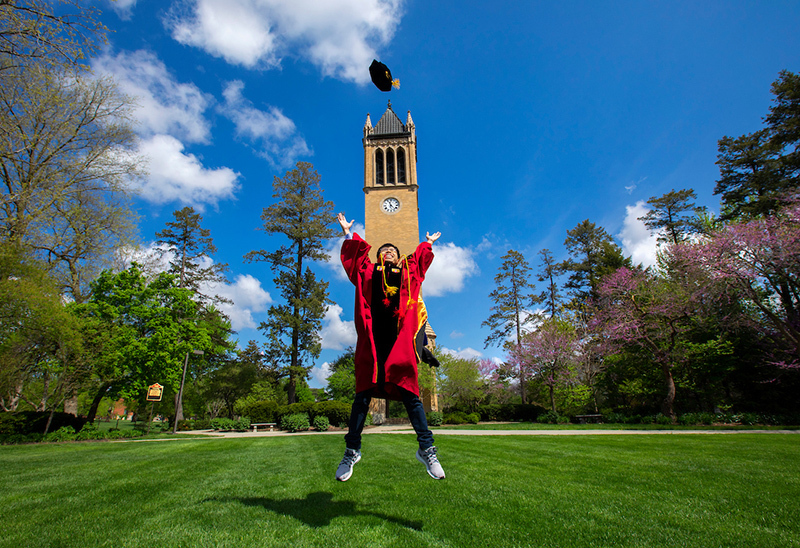
Thanh Nguyen joyfully celebrated a new doctoral degree in computer engineering as his wife, Huong Vu, took photographs Wednesday afternoon on central campus. Nguyen, Vu and their two children are moving to Seattle, where Nguyen has a job waiting for him at Amazon. Photo by Christopher Gannon.
An estimated 5,094 students are completing their Iowa State degrees this month. Although the COVID-19 pandemic will prevent them from celebrating with each other on campus, university leaders have invited them -- and their families -- to enjoy one of three commencement ceremonies prerecorded to honor them. The three events, for undergraduates, graduate students and Doctor of Veterinary Medicine (DVM) recipients, all go live at 10 a.m. Saturday, May 9, on the registrar's virtual graduation website. Each is approximately 30 minutes long.
As of May 6, the expected numbers of spring degree recipients are:
- DVM degrees: 138
- Doctoral degrees: 173
- Master's degrees: 484
- Bachelor's degrees: 4,299
Looking for a virtual event?
The registrar's virtual graduation website is a good place to start.
"Our spring class of 2020 especially had to sacrifice for the greater good due to the COVID-19 pandemic," said university registrar Jennifer Suchan. "We know we can't be together, but we want to celebrate their momentous achievements while honoring them in a way that's safe for everyone.
"The university community really came together for this purpose. There was so much energy at the table as we considered what we wanted to do for our graduates," she added.
Traditions intact
University leaders recorded many components of the virtual ceremonies in late April on the Stephens Auditorium stage, and IT teams wove them together in the days since. Suchan said many Iowa State commencement traditions are intact in the graduate and undergraduate virtual ceremonies, including:
- Music and theatre department's F. Wendell Miller Distinguished artist in residence Simon Estes singing the national anthem.
- Special recognition for college student marshals and students graduating with distinction.
- Remarks and conferring of degrees by President Wendy Wintersteen.
- Iowa State-themed music performed by the ISU Brass Ensemble.
- The Iowa State Singers performing "The Bells of Iowa State."
Veterinary Medicine
The College of Veterinary Medicine confers the DVM once a year in a separate spring ceremony.
Associate dean for academic and student affairs Jared Danielson emcees the virtual ceremony, and the Dr. Stephen G. Juelsgaard Dean of Veterinary Medicine Dan Grooms speaks to the graduates. The commencement address is provided by ISU alumnus Dan Thomson, a third-generation bovine veterinarian and, since April, chair of the animal science department in the College of Agriculture and Life Sciences. Second-year DVM student Anvita Hanchate performs the vocal pieces in the ceremony. Faculty member Amanda Fales-Williams and class president Seth Wilharm lead the graduates in reciting the Veterinarian's Oath.
Recognizing individual students
Because much of an in-person commencement ceremony is devoted to individual moments for graduating students, each of the virtual events also includes this tradition:
- During the Graduate College ceremony, doctoral and master's candidates' names and majors are displayed.
- Formal photos introduce each DVM candidate as Danielson reads their names during the Veterinary Medicine virtual event.
- In separate videos for the six undergraduate colleges, Ames-based radio producer Hollis Monroe and landscape architect associate professor Michael Martin read the names of students completing bachelor's degrees as their printed names are displayed, one at a time. Each college dean also honors that college's student marshal. These college videos also will be available on demand Saturday morning.
All spring 2020 graduates also may participate in commencement events on campus, including the hooding tradition for doctoral candidates, either in December or next May.
College virtual convocations
In lieu of their convocations and receptions, the colleges also are prerecording virtual events to recognize and congratulate their students, in many cases at the department level. Colleges asked students to submit photos and information for these recordings. In addition to a website, most colleges will post their materials to a Facebook, Facebook Event or YouTube site so students can chat in real time.
- College of Agriculture and Life Sciences, Friday, May 8 (on demand beginning at 9 a.m.)
- Ivy College of Business, Friday, May 8 (on demand beginning at 5 p.m.)
- College of Design, Saturday, May 9 (on demand beginning at 9 a.m.)
- College of Engineering, graduate students: Thursday, May 7 (6 p.m.); undergraduates: Friday May 8 (by department, at specific times throughout the day)
- College of Human Sciences, Friday, May 8 (on demand beginning at 1 p.m.)
- College of Liberal Arts and Sciences, Friday, May 8 (on demand beginning at 7 p.m.)
Lavender Graduation, which honors graduating members of the university's lesbian, gay, bisexual, transgender, queer, intersex, asexual and ally community, also will be presented as a virtual celebration. Staff in the Center for LGBTQIA+ Student Success hope to post the video May 7 (or shortly after) on its website and social media sites.
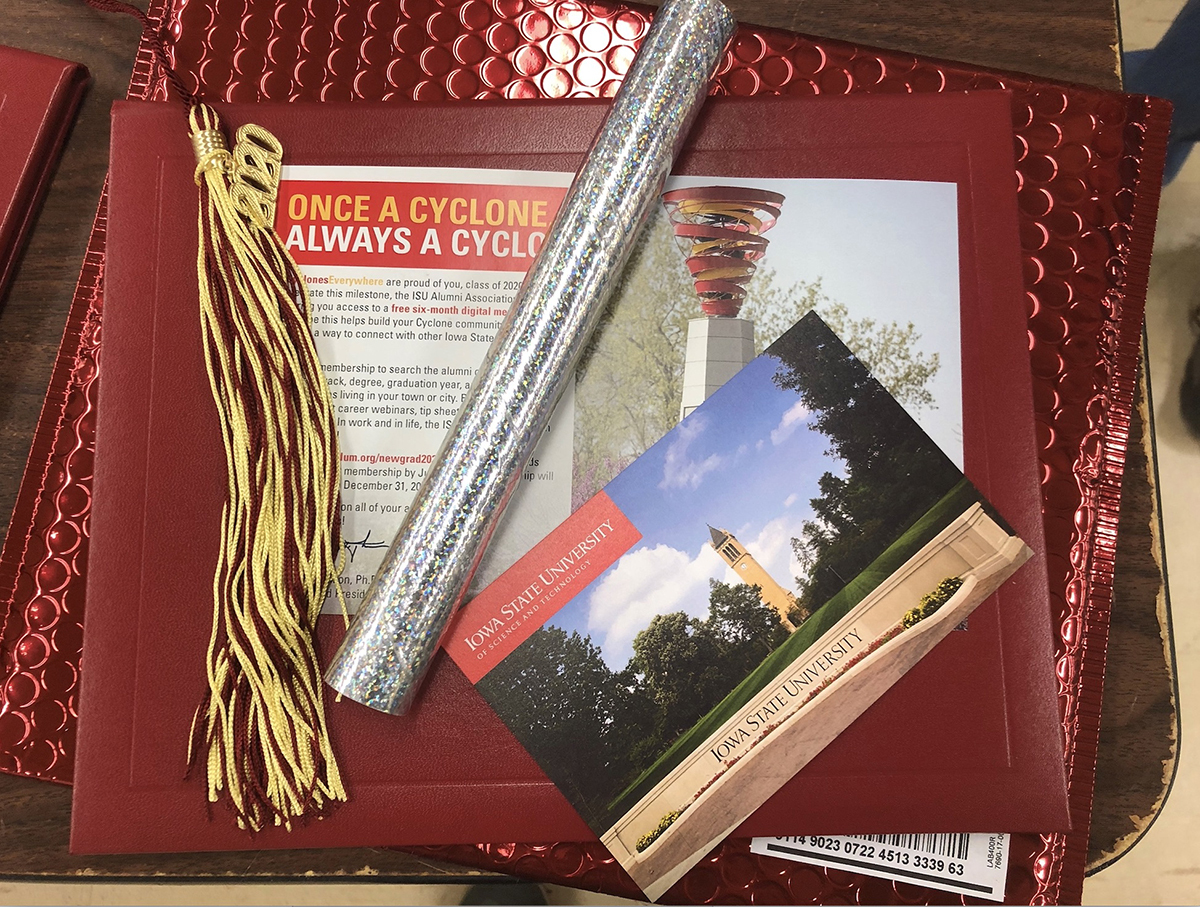
CYlebration gift packages were sent to spring graduates. Contributed photo.
Commencement souvenirs
In late April, the registrar's office mailed "CYlebration" gift packages to all graduating students that included a souvenir cardinal-and-gold tassel, postcard message from Wintersteen, diploma cover and streamer tube. Within a few weeks of graduation, Suchan said a second mailing to all graduates will include their diploma, commencement program and honor cords for students graduating with distinction.
Senate tentatively closes out the academic year
The Faculty Senate wrapped up the academic year at its May 5 meeting but left the door open to call meetings over the summer. In light of the COVID-19 pandemic and uncertainty about how and when the university will return to "normal" operations, senators agreed to meet if important decisions are needed during the summer.
"The idea is not to waste the senate's time. These meetings would likely be called if there were really pressing issues that needed full senate discussion," said senate president Jonathan Sturm.
Faculty advancement
Senior vice president and provost Jonathan Wickert presented his annual report on faculty advancement, which included decisions on 100 cases for promotion and/or tenure. Among them, 58 faculty were promoted to associate professor with tenure, 39 tenured faculty were promoted to full professor and one associate professor earned tenure. Two cases were not approved.
The promotion and tenure cases both reviewed and granted were equally split between males and females. Among those granted tenure and promotion, 65 are white/Caucasian, 26 are Asian/Asian-American, five are Latino/a or Hispanic, and two are black.
The bulk of the cases considered were from a cohort of 105 faculty hired in fiscal year 2014, of which 86 were tenure-eligible and 19 were hired with tenure. As of this April, 57 cohort members are tenured, 16 have extended tenure clocks, 28 left ISU, two were denied tenure, one moved to a term appointment and one retired.
Wickert also included advancement for term faculty in his report. Promotions for 60 of 62 term faculty were approved across five career tracks -- adjunct, clinical, teaching, practice and research.
Scholarships for home-schoolers
Senators approved changes to the policy the admissions office uses to award automatic scholarships to home-schooled students. To eliminate a possible conflict of interest for grades assigned by parents, only standard test scores (ACT/SAT) will be used for home-schooled students who do not have an independent GPA.
The policy changes will go into effect for fall 2021 applicants. The changes impact six automatic scholarship awards available to direct-from-high school incoming freshmen -- three for Iowa residents and three for nonresidents. Minimum test scores for home-schoolers have been established for the two awards that are solely based on GPA.
Other business
Senators approved:
-
The 2020 spring graduation list of more than 5,000 students expected to earn degrees this semester
-
A proposal to disband the senate's university services committee and assign its duties to the university resource policies and allocations council
-
Proposed changes to the policy and procedures for course changes (for example, dropping a class) during the second period of a semester (sixth class day through the Friday of week 10). Academic affairs council chair Andrea Wheeler said instructor and adviser signatures are required -- not to grant permission, but to show that a conversation with the student happened prior to the change. "It's still the student's decision to drop the class," she said.
-
A consistent minimum GPA requirement of 2.25 for all transfer students -- international and domestic -- to simplify admission requirements. Currently, international transfers must have a 2.3 GPA, while international engineering applicants must have a 2.75 GPA.
Senators will vote on a proposed graduate certificate in breeding for organic crops when the senate reconvenes in the fall. The four-course, 12-credit certificate will be delivered online by the agronomy department, which already offers an online master of science program in plant breeding.
Jonathan Sturm (music) passed the gavel to 2020-21 senate president Carol Faber (graphic design). Andrea Wheeler (architecture) assumed the role of president-elect.
Rao will serve as interim VP for research
Senior vice president and provost Jonathan Wickert announced this week that Guru Rao will serve as interim vice president for research (VPR), effective July 1.

Guru Rao
Rao, who serves as associate VPR and professor in the Roy J. Carver department of biochemistry, biophysics and molecular biology (BBMB), will succeed Sarah Nusser, who announced last September her intent to complete her service at the end of the fiscal year.
"Guru is a renowned scientist, administrator and university citizen who is highly respected in every corner of campus," Wickert said. "I appreciate his willingness to serve -- particularly during this unprecedented time, and in these unique circumstances -- and I know he will do an exemplary job."
Rao joined the Iowa State faculty in 2006 after working 18 years as a researcher at DuPont Pioneer. He was named chair of the BBMB department in 2007 and served in that capacity until his appointment as associate VPR in 2016.
An accomplished scientist, Rao is an inventor with 26 patents related to the development and application of engineered proteins. He earned a Ph.D. in biochemistry from the University of Mysore in India. He is an elected fellow of the American Association for the Advancement of Science and the National Academy of Inventors and a member of Pioneer's Inventors Hall of Fame.
"I am humbled by this opportunity to serve my colleagues," Rao said. "I look forward to continuing the great work of Sarah Nusser to grow Iowa State's research enterprise and maintaining an environment that will allow our next VPR to be successful."
Search will resume as soon as possible
A search for Nusser's permanent replacement is underway, including the identification of four finalists. The search was temporarily suspended due to the COVID-19 pandemic. Wickert said the university will resume in-person finalist visits as soon as it is feasible. Details will be shared in Inside Iowa State when they're known.
"We prefer to have in-person, on-campus interviews for positions such as the VPR, who interacts with faculty and staff in every academic discipline," Wickert said. "Suspending the search until it is safe for finalists to visit -- and to introduce themselves to the campus community -- is the right thing to do at this time."
Related stories
Campus visits scheduled for vice president for research finalists, March 5, 2020
Nusser to complete service as VPR next summer, Sept. 19, 2019
Five questions for the commencement announcer
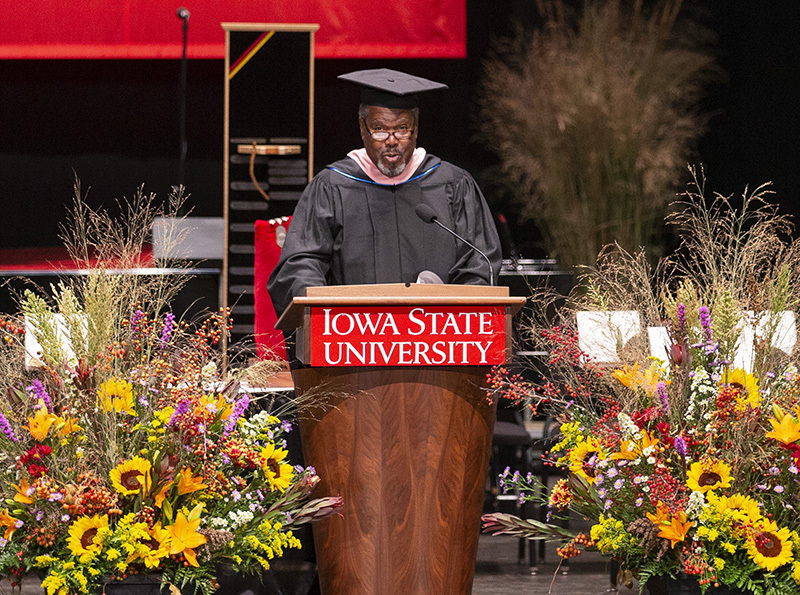
Hollis Monroe, the primary commencement announcer at Iowa State graduation ceremonies for 25 years, at the podium during a rehearsal for President Wendy Wintersteen's 2018 installation ceremony. Photo by Christopher Gannon.
The basics
Name: Hollis Monroe
Position: Commencement announcer
Years in role: 25
Education: Bachelor's degree in vocal performance, Marycrest College, Davenport
Spring is lighter on pomp and heavier on circumstance this year, as coronavirus social distancing forces Iowa State to honor its newest graduates in a prerecorded online ceremony instead of the customary commencement. One aspect of graduation that will remain in the virtual version is the voice of Hollis Monroe, the former on-air producer at WOI Radio who has been the university's primary commencement announcer for 25 years. Monroe talked with Inside Iowa State this week about the long-standing role, which includes reading the names of more than 70,000 graduating students over a quarter century.
Is it satisfying to play a part in such a joyful time for students?
Oh, very much so. I take the extra time. Initially, one of the things I'd do -- and that I continue to do -- is call the students ahead of time who have names that are difficult to pronounce, especially the doctoral and master's students, and say, "Hi, I'm Hollis Monroe, and I'm the speaker for your commencement. By the way, congratulations. I just figured that after all your hard work, time, effort and money, the least we can do is get your name right as you walk across the stage." They're usually quite pleased with that. There are very few to call now. I speak several languages, so I'm fairly conversant, and I've said so many names over and over again that I recognize them. As the commencement ceremony has evolved, a lot of the students provide pronouncers.
Is it an intriguing challenge when you come across a name you know is going to be tough?
Yes, especially with the undergraduates. Many undergraduates don't submit pronouncers. Some of them have their name just hand-written on a card, and they get it in at the last minute. You have a split second to look at it, pronounce it and hand it to the photographer's assistant who keeps all the cards in order, and you're on to the next one. And there's just a beat in between each one. Someone asked me once how I know if I get a name right and I said that generally if the family applauds, you got close. I've had names that are jawbusters come up where you take the card, say it right, and the student turns around, smiles and shakes my hand.
Why is it important to celebrate graduating students?
To students, this is an acknowledgement of all their hard work, their effort over the past years and the efforts of their families and friends who supported them. It's the moment of recognition of all they've accomplished at Iowa State. It's recognition that they're an important part of the university and its history, and they're going to carry that with them wherever they go. For the university, it's an acknowledgement of the most important role the university plays. This is its main job, educating these young people and this next generation of leaders.
How did you participate in the virtual ceremony?
Actually, I did some reading for the announcements at the podium, where it would take place, for the ambience. "Good evening, and welcome to the spring commencement ceremony for Iowa State University for 2020," and then on from there. Then all the names, I did from a booth. They had a booth set up, very clean and wiped down, where I read all the names.
Did you take part in your own college commencement?
I have to admit, I was on the other side of the coin. I went for two and a half years, and then I ran out of money, worked for two years, then went back and finished up for another two and a half years. I said, "Mom it's been seven years, they can just mail it to me." My mother, all 4 foot-10 of her, walked up to me and said, "Boy, I've waited seven years for this. You're going to walk across that stage, you're going to shake that white man's hand, he's going to hand you that diploma and I'm going to get it on film, you understand me?" I said, "Yeah, Mom, I better get a robe." I know a lot of people would prefer not to participate, but once they're there, they're glad they did.
Regents propose flat tuition for fall
At its June 4 meeting, the state Board of Regents will vote on a proposal for flat tuition and mandatory fees for all students during the 2020-21 academic year. Board president Mike Richards presented the plan during a special meeting April 30, and it received its requisite first reading at a subsequent May 4 meeting. Richards said the board would reassess spring semester tuition in late fall, if needed.
"It's important for students, families and our institutions to have as much financial predictability as soon as possible," Richards said, noting the COVID-19 pandemic has impacted everyone.
He also noted the pandemic is hitting during an already challenging time for higher education, including increased competition for both students and state financial support. Those changes likely will be accelerated, he said.
Proposed tuition* and mandatory fees: 2020-21
|
|
Resident |
Nonresident |
|
Undergraduate |
$9,320 |
$24,508 |
|
Graduate |
$10,990 |
$25,952 |
|
Professional (Vet Med) |
$25,498 |
$54,582 |
*Standard tuition; doesn't reflect differential tuitions
COVID-19 costs
The primary purpose of the April 30 meeting was for regent university presidents to update board members on financial losses and costs due to the pandemic. Collectively, they outlined $263 million in lost revenue and added expenses. President Wendy Wintersteen said a "conservative" estimate for Iowa State, covering early March to late August, is $88 million in refunds and lost revenue, and nearly $1 million in additional expenses. She noted these estimates don't reflect the impact of reduced research operations, but do include things like:
- Refunds for unused portions of student housing and dining contracts and parking permits.
- Emergency flight changes to help study-abroad students return home and refunds for programs cut short or canceled.
- Prorated refunds for course fees that supported hands-on components, such as field trips and lab supplies.
- Costs to move courses online.
- Costs to support employees working remotely.
- Costs to provide personal protective equipment and additional cleaning supplies for front-line employees in public safety, health care and facilities operations.
- Lost revenue for canceled conferences, seminars, athletic events and performances.
- Lost earnings on ISU endowments.
- Lost revenue due to modified operations in veterinary medicine service units.
"The Iowa State community has responded to this crisis with creativity, innovation and flexibility," Wintersteen told the board. "We're very proud of our faculty and staff who responded quickly to uphold the land-grant mission to ensure critical university operations continue and to keep our students on track with their academic progress."
Inter-university efficiencies
Richards also announced April 30 a four-member advisory group to look for opportunities among the three regent universities to collaborate for efficiency.
"We don't know what financial toll this pandemic will have on our institutions, but we know it's significant," he said. "We can't focus on returning to business as usual. We must be proactive about the hurdles ahead and redesign our universities to make them stronger."
Regents David Barker and Nancy Dunkel will co-chair the committee, joined by regents Nancy Boettger and Jim Lindenmayer. Richards asked them to look at possibilities in both administration and academics. Their recommendations are due at the board's November meeting.
"These are things we needed to consider before COVID-19, and things we now must consider," Richards said. Examples could include:
- Students from one university taking online classes at another university.
- Consolidating some administrative duties that occur at all three universities.
- Moratorium on new construction.
Richards also reiterated the board's intent "to have our campuses fully operational this August.
"This decision will be made only if supported with guidance from the CDC, Iowa Department of Public Health, the governor's office and others," he said, "but we must plan as if this is going to be the case."
Bond sale
During the April 30 meeting, the board also approved a sale of $17.6 million of ISU dormitory revenue refunding bonds to refund three previous sales of dormitory revenue refunding bonds in 2010 and 2011. Those in turn refunded bonds sold to help build Frederiksen Court Apartments, Eaton Hall and the Union Drive Community Center. A lower interest rate (2.05%) will save the university an estimated $1.56 million.
Extension hotline staff step up as 211 call volume spikes
It's been a challenging spring for ISU Extension and Outreach human sciences hotline staff, who provide answers and referrals for Iowans with a wide range of questions but lately have been swamped by coronavirus inquiries. The calls come more frequently and are more intense than usual, and colleagues aren't sitting nearby to serve as a sounding board or to pipe in with an uplifting word.
How to get help
Both 211 and Iowa Concern hotlines offer free, confidential help 24 hours a day. Reach Iowa Concern at 800-447-1985. Call 211, 800-304-0334 or 515-252-7858 for the 211 service. Access 211 services by email at 211@iastate.edu, by text message Monday-Friday (8 a.m.-8 p.m., text your zip code to 898211) or via the mobile app.
But the stress is worse on the other end of the line, which is why it's a fulfilling time to be helping, said Tammy Jacobs, hotline coordinator for Human Science Extension and Outreach.
"There's a lot of fear and a lot of frustration. If we can help ease some of that burden, that's what we're there for. We're there to help Iowans become better Iowans. As long as we can keep doing that and helping them, it's all worth it," she said.
Calls increasing
The bulk of the increase in calls have been to 211, a nationwide three-digit hotline for finding local access to health care, mental health resources, food, employment, government help and other needs -- a one-stop shop for health and human services. State communications about the coronavirus in Iowa often have recommended calling 211 as a source for individualized help.
ISU Extension and Outreach is a partner in Iowa's 211 system, with full-time staff who answer calls for a 25-county region that extends northwest from Story County. The United Way organizations based in Des Moines, Omaha and the Quad Cities handle most of the other counties, with Wisconsin-based Gunderson Health Systems serving five counties in northeast Iowa. The extension call center also answers other hotlines, among them Iowa Concern (legal, financial, stress and crisis issues), AnswerLine (home and family issues), Teen Line (help for teens and those who care about them) and Healthy Families (health information for the entire family).
The role 211 is playing in the crisis is clear in the call volume. From March 8 to April 30, the extension call center took 6,749 calls, 89% of them to 211, Jacobs said. During that same time period in 2019, it took 2,435 calls, 55% to 211. The calls also are running longer -- about four minutes during that time period this year compared to three minutes last year, she said. To manage the increased workload, the size of the call center team has temporarily increased from four to 10, with four extension staff shifting from their regular duties to hotline work.
A reassuring presence
Jacobs said some callers just need to talk to someone who will listen, validate their concerns, reassure them and sort fact from fiction.
"A lot of callers right now don't know who to believe or who to trust. They don't know what information to look at. They're seeing all kinds of information on social media," she said.
For COVID-19 health questions, hotline staff have scripts provided by the Iowa Department of Public Health to answer questions about common topics such as testing. They glean information from reputable sources to flesh out responses.
"We make sure that if it's something specific, it's accurate," Jacobs said.
Often, callers are referred to online resources, such as the assessment for qualifying for drive-thru coronavirus testing or online applications for unemployment insurance benefits. Hotline staff also maintain a database for providing callers detailed information on local resources, such as food banks and closed schools offering meal deliveries -- both which have been critical, Jacobs said.
"With all the children not eating breakfast and lunch at school, that's an additional burden on families," she said.
Just in time
Starting with extension's staff last summer and wrapping up in February, the extension and United Way call centers moved to a web-based phone system that allows their staffs to answer calls statewide and access local resources for out-of-region callers. That's helped even out the call load.
"We can jump in and help seamlessly," Jacobs said.
The web-based phone service, which replaced a system nearly three decades old, came along at an opportune time. It's also why hotline staff are able to work remotely.
Connecting virtually made the process of training temporary employees more efficient, Jacobs said.
"Rather than train four different times, I could train everybody at the same time. Zoom is one of my best friends right now," she said.
At first, Jacobs was concerned about how staff would handle not being able to bounce ideas off each other or be available to support each other easily. But with virtual tools such as Zoom and Microsoft Teams, it's been smoother than she expected.
"It's almost like you're sitting there face-to-face with the person," she said.
The front line
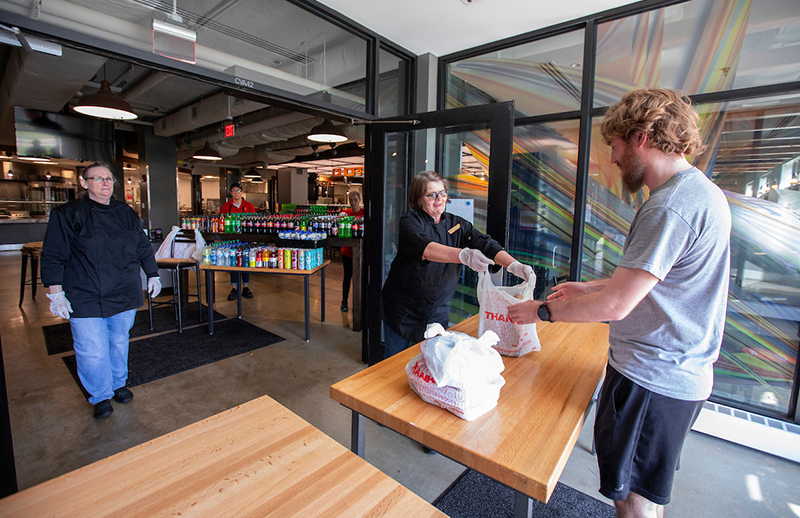
Photo by Christopher Gannon.
ISU Dining cook Dee Johnson (center), hands off prepared meals to Iowa State senior Gabriel Blandin during pickup service at Friley Windows dining hall. Johnson's colleague, cook Nancy Croker, looks on from a safe distance. Dining staff are among the hundreds of essential university employees working on campus during the COVID-19 pandemic.
